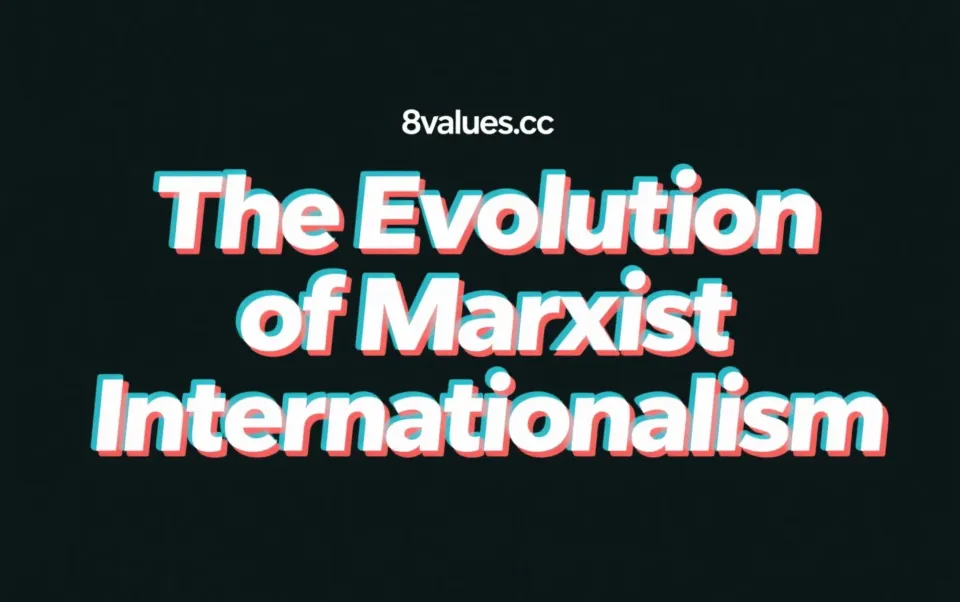The Evolution of Marxist Internationalism: The Communist Manifesto and the National Independence Movement
The international solidarity claim of working class proposed by Marx and Engels in the Communist Manifesto is the cornerstone of Marxism. This article explores in-depth the argument that “workers have no motherland” and how later Marxists (such as Lenin and Trotsky) extended this theory to national independence and anti-colonial movements, revealing its core values in contemporary global struggles.
In February 1848, The Communist Manifesto, written by Karl Marx and Friedrich Engels, was first published in London. This programmatic document is considered to be one of the most influential political documents in history and the foundational text of the Marxist theoretical system. It comprehensively and systematically elaborates on the theory of scientific socialism, and the core idea lies in historical materialism : economic production and exchange modes and the resulting social structure are the basis on which political and spiritual history depend . According to this view, all the history of existing societies to date is the history of class struggle .
One of the core propositions of the Communist Manifesto is internationalism and the global solidarity of the proletariat .
"Workers have no motherland": Theoretical cornerstone of international solidarity
In the "Communist Manifesto", Marx and Engels made the famous statement that "workers have no motherland" in response to the bourgeois accusations of communism.
The bourgeoisie accused the Communists of wanting to abolish the country and the nation . In this regard, the Communist Manifesto points out that the working class does not have a motherland and cannot take away what they do not have from them. But the proletariat must first seize political rule , rise to the leadership of the nation , and form itself into a nation . Therefore, in this sense, the proletariat itself is national , but its nationality is not nationality in the bourgeois sense .
The Communist Manifesto further clarifies that the global development of the bourgeoisie itself is eliminating ethnic differences and oppositions among peoples of all countries. This is caused by the unity of free trade, the world market, production model and the corresponding living conditions resulting from it . The rule of the proletariat will accelerate the disappearance of these oppositions.
The Death of Class Opposition and the Call of World Revolution
Marxism believes that class struggle has promoted the development of human history. With the development of modern industry and the establishment of the world market , the bourgeoisie played a "very revolutionary role" in history, creating "more than what has been created in all generations in the past and has become more productive." The bourgeoisie used the "heavy artillery" of cheap commodities to destroy all old barriers, making the production and consumption of all countries have global characteristics.
However, the inherent contradiction of capitalism— the socialization of production and the private possession of means of production —must lead to its demise and produce "grave diggers" , i.e. the proletariat.
The liberation of the proletariat is an international movement . Marx and Engels emphasized: "The action of joint, at least the action of the civilized state, is one of the primary conditions for the liberation of the proletariat."
- The extinction of national exploitation: As individual exploitation of individuals is eliminated, national exploitation of nationality will also end.
- The end of hostile relations: As class antagonism within the nation disappears, hostile relations between nations will end.
The Communist Manifesto concluded with its powerful revolutionary call: "Proletarians all over the world, unite!" ("Working Men of All Countries, Unite!"). This slogan concentrates on the spirit of international solidarity that the proletariat must possess in order to achieve its own liberation and to establish a society without class and private property.
The Communist Manifesto of 1848 is insufficiently concerned about the colonial issue
Although the internationalist principles of the Communist Manifesto were universal, as it was written in 1848, when Marx and Engels focused their main energy on the bourgeois revolution within Europe . In the fourth chapter of the Communist Manifesto, that is, on the relationship between the Communists and other opposition parties, Russia and the United States were absent because at that time (December 1847), Russia was regarded as "the last huge reserve force of all reactionary forces in Europe" , while the United States "absorbed the excess proletarian force in Europe" through immigration. These two countries were "the pillars of the existing European system" at that time.
Therefore, the Communist Manifesto has obvious limitations on the colonial issue:
- The lack of colonial struggle: The Communist Manifesto does not mention the struggle for independence between colonial and semi-colonial countries.
- Presupposition of the solution path: Marx and Engels believed at the time that the colonial problem would be automatically resolved mainly through the victory of the proletariat in the "major civilized states" (i.e., the European capitalist center), rather than through the independence movement of the oppressed nations.
However, Marx's later research, especially the last part of the first volume of Das Kapital, gave a deeper explanation of the origin of capitalism, the process of "so-called primitive accumulation" . The process of primitive accumulation includes the deprivation of the agricultural population, colonialism , the government debt system and the slave trade , which constituted a necessary part of the development of early capitalism.
The deepening of Marxism: the supplement of Lenin and Trotsky
As capitalism entered the monopoly stage, that is, the era of imperialism , the national liberation struggle between colonial and semi-colonial countries became an important part of the world revolution. Later Marxists revised and supplemented the internationalist theory of the Communist Manifesto based on new historical conditions.
Lenin: The core position of the oppressed nations
Vladimir Lenin is a major contributor to the development of the oppressed national revolution strategy . The success of the Russian October Revolution (1917) was seen as a sign of the shift of the revolution’s focus from Europe to the East.
Lenin and the Bolsheviks believed that the slogan that just shouted "Proletarians in the world, unite!" was no longer fully applicable under new historical conditions. They put forward new slogans that extend the spirit of internationalism to a wider oppressed group:
- “The working class and oppressed nations all over the world unite!”
The change in this slogan was to "support the struggle for self-determination and freedom of the colonial people." Under colonialism, all oppressed people —whether the bourgeoisie, petty bourgeoisie, workers, or peasants—are oppressed. The movement of colonized people against imperialist oppressors was "one of the most important and powerful movements against the existing order" , which required "complete, unconditional and infinite support" by the white proletariat.
Lenin's theory of imperialism pointed out that the struggle between colonial and semi-colonial countries is no longer a passive appendix to the European proletarian revolution, but an active and independent link in the world's revolutionary chain .
Trotsky: National issues and the theory of lasting revolution
Leon Trotsky also emphasized the deepening of this theory when writing the preface for the Communist Manifesto. He pointed out that the nature of the international revolution has been predetermined by the global development of capitalism.
Trotsky reiterated the basic position of the Communist Manifesto: "Workers have no motherland." He believes that for advanced capitalist countries, the "national motherland" has become the "most harmful historical brake."
However, he added that in backward countries that are forced to fight for independence, the "national motherland" remains a "relatively progressive factor." For the revolutionary parties in these countries, "a clear understanding of the organic connection between the democratic revolution and the dictatorship of the proletariat, and the resulting international socialist revolution" is a matter of life and death. These views of Trotsky echo the continuous revolutionary theory that links the national democratic revolution with the socialist revolution.
The Continuous Impact of Marxist Internationalism on Contemporary Society
Although the Communist Manifesto as a historical document, some of the specific measures and criticism of early socialist schools (such as the content of Chapter 3 ) have been outdated in practice, its general principles are still correct overall to this day.
The spiritual power and ideological value of the "Communist Manifesto" are reflected in the criticism of the ills of contemporary capitalism and the scientific foresight of the direction of human society.
- Criticism of Capitalism: The Communist Manifesto is still recognized as an effective tool for analyzing the ills of capitalism and the path of human development. For example, after the global financial crisis broke out in 2008, sales of the Communist Manifesto and another Marx masterpiece, Das Kapital, rose sharply, suggesting that people are still seeking a profound explanation of the inherent contradictions of capitalism.
- Ideological analysis: The Communist Manifesto explains that "the ruling thought of every era is always just the ruling class." By criticizing the concepts and legal principles of the bourgeoisie (such as "freedom" and "law" ), it is revealed that these ideas are nothing more than the product of "bourgeois production conditions and property relations" .
- Necessity of revolution: The Communist Manifesto is known for its power of revolutionary action calls . It publicly declared that "their purpose can only be achieved by violent overthrowing all existing social systems." This demand for change still echoes in today's era of increasing economic inequality and prominent social contradictions.
The evolution of Marxist internationalism, from the fact that it focused on the union of the European proletariat in 1848, to the inclusion of national liberation and anti-colonialism into the category of world revolution in the era of Lenin and Trotsky, reflects the spirit of Marxist theory to constantly criticize and innovate itself with the changes in historical conditions.
In today's world, whether analyzing exploitation and oppression through class , race or national frameworks, international solidarity has always been the cornerstone of achieving social justice. If you are interested in these political thoughts and their positioning in the ideological lineage, try the 8values Political Values Prone Test , explore your ideological stance, and learn more about all outcomes of 8values ideologies .






